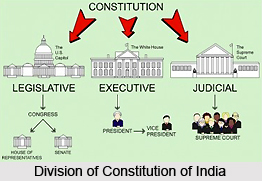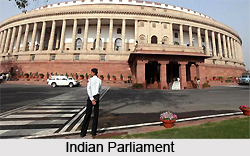 Fundamental Rights are provided to the citizens by the Constitution of India. The Fundamental Rights and Duties are among the vital sections of the Constitution and prescribe the fundamental obligations of the state to its citizens and the duties of the citizens to the state. These are the essential elements of the constitution and they were developed by the Constituent Assembly of India between 1947 and 1949. Part III of the Constitution of India describes the Fundamental Rights offered to the country`s citizens. Fundamental Rights are essential human rights that can are offered to every citizen irrespective of caste, race, creed, place of birth, religion or gender. Fundamental Rights are subjected to specific restrictions and enforceable by courts. These are equal to freedoms and these rights are essential for personal good and the society at large.
Fundamental Rights are provided to the citizens by the Constitution of India. The Fundamental Rights and Duties are among the vital sections of the Constitution and prescribe the fundamental obligations of the state to its citizens and the duties of the citizens to the state. These are the essential elements of the constitution and they were developed by the Constituent Assembly of India between 1947 and 1949. Part III of the Constitution of India describes the Fundamental Rights offered to the country`s citizens. Fundamental Rights are essential human rights that can are offered to every citizen irrespective of caste, race, creed, place of birth, religion or gender. Fundamental Rights are subjected to specific restrictions and enforceable by courts. These are equal to freedoms and these rights are essential for personal good and the society at large.
Fundamental Rights are preserved as they guarantee civil liberties to all the citizens of the country for a calm and pleasant life. These are individual rights and comprise freedom of speech and expression, freedom to practice religion, equality before law, freedom of association and peaceful assembly and the right to constitutional remedies for the safeguard of civil rights by means of writs such as habeas corpus. The concept of providing the fundamental rights to the citizens has been taken from the England`s Bill of Rights; United States Bill of Rights and also France`s Declaration of the Rights of Man. Anyone who is violating the fundamental rights will face punishments in the court of law.
The Constitution of India guarantees six Fundamental Rights to the citizens. Right to Equality is the foremost right guaranteed to the citizens of India. It is provided in Articles 14, 15, 16, 17 and 18 of the constitution. This right is regarded as the principal foundation of all other rights and liberties. The Right to Equality guarantees Equality before law as per which citizens shall be equally protected by the laws of the country. Article 15 of the constitution states that there will be social equality and equal accessibility to public areas and no person shall be discriminated on the basis of caste, religion and language. Equality in matters of public employment is provided in Article 16 of the constitution of India that defines that all citizens can apply for government. Article 17 puts forth abolition of untouchability. The practice of untouchability is an offense and anyone found doing so is punishable by law. Abolition of titles is another right to equality described by the Article 18 of the constitution. It forbids the state from conferring any titles to the citizens of India.
 Among the Fundamental Rights, Right to freedom is included in the articles 19, 20, 21 and 22. Right to freedom includes Freedom of speech and expression, Freedom to assemble peacefully without arms, Freedom to form associations or unions and Freedom to move freely throughout the territory of India. Furthermore, Right to freedom also states that citizens have the Freedom to reside and settle in any part of the territory of India and also have the Freedom to practice any profession or to carry on any occupation, trade or business. However, subject to reasonable restrictions by the State in the interest of the general public. Certain safeguards are envisaged to protect the citizens from exploitation and coercion.
Among the Fundamental Rights, Right to freedom is included in the articles 19, 20, 21 and 22. Right to freedom includes Freedom of speech and expression, Freedom to assemble peacefully without arms, Freedom to form associations or unions and Freedom to move freely throughout the territory of India. Furthermore, Right to freedom also states that citizens have the Freedom to reside and settle in any part of the territory of India and also have the Freedom to practice any profession or to carry on any occupation, trade or business. However, subject to reasonable restrictions by the State in the interest of the general public. Certain safeguards are envisaged to protect the citizens from exploitation and coercion.
Right against exploitation is another essential among the Fundamental Rights. This right is given in the Articles 23 and 24. It provides for two provisions such as abolition of trafficking in human beings and forced labour. The right also lays down abolition of employment of children below the age of 14 years in dangerous jobs like factories and mines. Right to freedom of religion is included under articles 25, 26, 27 and 28. It provides religious freedom to all citizens of India and sustains the principle of secularism in India. The Constitution provides that all religions are equal before the state and no religion shall be given preference over the other. Citizens are free to preach, practice and propagate any religion of their choice.
Fundamental Rights also provided Cultural and educational rights to its citizens and it is covered in Articles 29 and 30. According to this right ant community which has a language and a script of its own has the right to conserve and develop them. No citizen can be discriminated against for admission in State aided institutions. All minorities, religious or linguistic, can set up their own educational institutions in order to preserve and develop their own culture. Right to constitutional remedies is also provided in the constitution. This right authorises the citizens to move a court of law in case of any denial of the fundamental rights. The courts can issue various kinds of writs and these writs such as habeas corpus, mandamus, prohibition, quo warranto and certiorari. These writs help preserving and safeguarding the fundamental rights of the citizens of India.
Another prominent among the Fundamental Rights was the Right to property. Right to property in order to guarantee to all citizens the right to acquire hold and dispose off property. However, the 44th amendment act of 1978 removed the right to property from the list of Fundamental Rights. Article 300-A, was added to the Constitution which provided that `no person shall be deprived of his property save by authority of law`.
Fundamental rights are the freedoms that are given to the country`s citizens. They help in protecting as well as preventing gross violations of human rights. They give emphasis to fundamental unity of the country by guaranteeing the access and use of the same facilities, irrespective of caste, colour, creed and religion to all citizens. The fundamental rights were provided primarily to protect individuals from any arbitrary state actions, but some rights are enforceable against individuals. Only through a constitutional amendment, the Fundamental Rights can be altered. In addition to that during national and state emergency, the Fundamental Rights remain suspended.






